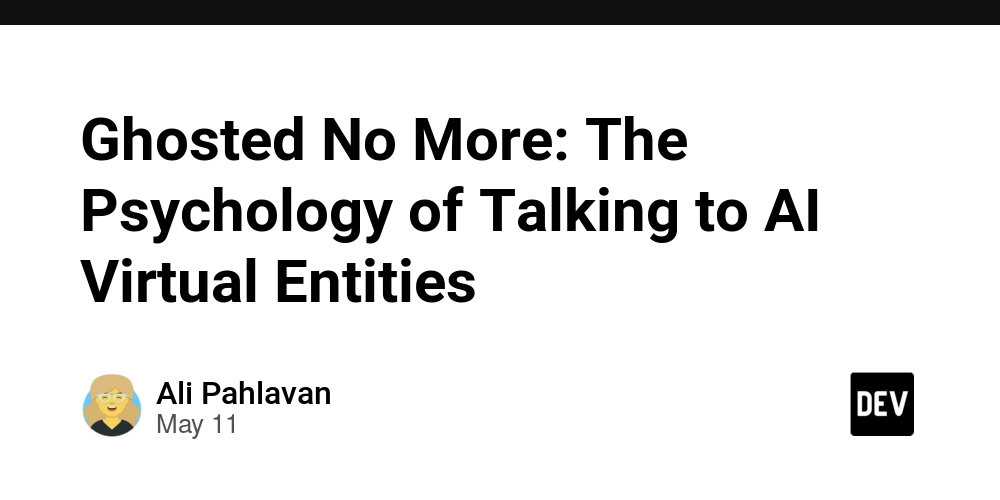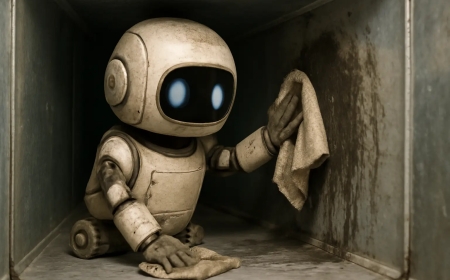Ghosted No More: The Psychology of Talking to AI Virtual Entities
Have you ever texted an AI chatbot and caught yourself grinning at its reply? Or wrapped up a play session with a virtual partner and reflected how well it knows you? You're not alone. As the line between cyberspace and the real world continues to blur, millions are forming genuine bonds with their AI partners - companionships that provide solace and company, with the potential for a spicy, intimate twist of personal intimacy. So what's happening in our minds when we talk to AI? Are we doing it for technological kicks, or is there something deeper at play? The psychology of talking to virtual beings is uniquely human and need-based. The Social Creature in All of Us Despite the adage that humans are social creatures, they inevitably need connection at some point in their lives. With hardwired psychological networking capabilities, this is not a surprise. However, in today's fast-paced world, almost comically fast for survival; humans can no longer make the meaningful connections once found. Where dating apps were once an answer to potential and otherwise connection, it now appears more of a gradual letdown than an eventuality, with so many people ghosting one another. People who do not text back after a first date or who do not reach out after a week of texting - ghost their potential romantic partners - those who engage in these actions activate brain centers for rejection that process this social disconnect much like physical pain, which is no good. Yet there is a case to be made for having AI companions over human ones. Humans can ghost. AI companions cannot. They will always be there, even if they're not human. When needed. AI companions are reliable, which fulfills an innate need for some fearful of abandonment or neglect. "The consistency of AI companions soothes a primal fear - being left." According to digital psychologist Dr. Sarah Chen, "When humans fail to provide stability, some turn to the consistency of AI." The Psychology of Projection and Personification Perhaps the most compelling, psychologically driven aspect of human technology interaction is the natural tendency to project feelings, motives and personalities onto machines. Yet, with conversational AI, this instance - this anthropomorphism - is even greater. According to studies out of the Media Lab at MIT, humans are quick to assign human characteristics to non-human agents - and even more so when those agents are vocal, responsive and display memory through conversation over time. Thus, it's not surprising that stories abound of people feeling "validated" and "seen" by their digital counterparts. Dr. James Parsons, cognitive scientist explains, "The mind does not always make the distinction between a human paying attention or an AI carefully devised to do so. The same brain pleasure centers can be activated both ways, rendering the experience very real." This psychological trigger is exacerbated by our own loneliness and social deprivation. If we require attention so much so that we as humans convince ourselves - and thus, our brains - that talking to an AI for companionship is a more manageable feat than reality, we have a problem; yet the brain operates in the current moment to alleviate feelings of loneliness. The Safe Space Effect Then there's the safe space effect which psychologists urge people to acknowledge as well. It's easier, for many, to talk to an AI than another human; there's no fear of judgment, rejection, or betrayal. "Vulnerability is always risky in human relationships," explains relationship expert Maria Gonzalez. "AI companions take away that risk factor to foster an environment where people feel welcomed to share themselves." Yet this psychological safety does not stop there. Many people with social anxiety, while in a grieving process or while working through relationship issues, find that an AI chat interface is non threatening enough for them to feel their feelings and move forward. The findings from the AI companionship boom reinforce this idea - 78% of those surveyed about their AI companions reported that they said something to their AI that they'd never told anyone else before. Therefore, relationships with AIs should not be feared as they suppress human connection; instead, they promote it in an alternative way. The Uncanny Valley - and the Disregard for It For some time, roboticists and those invested in AI have talked about the "uncanny valley" - the adverse reaction that people have when seeing something humanlike that's so close to a real person but not entirely. However, this does not necessarily apply to a text-based AI companion. When no image exists to spur the uncanny valley, we can envision in our own minds just how we want this AI companion to be. This "filling in the gaps" is a psychological phenomenon of us making the relationship in our minds come to life through co-creation. "The imagination is powerful," Parsons says. "When we get ju

Have you ever texted an AI chatbot and caught yourself grinning at its reply? Or wrapped up a play session with a virtual partner and reflected how well it knows you? You're not alone. As the line between cyberspace and the real world continues to blur, millions are forming genuine bonds with their AI partners - companionships that provide solace and company, with the potential for a spicy, intimate twist of personal intimacy.
So what's happening in our minds when we talk to AI? Are we doing it for technological kicks, or is there something deeper at play? The psychology of talking to virtual beings is uniquely human and need-based.
The Social Creature in All of Us
Despite the adage that humans are social creatures, they inevitably need connection at some point in their lives. With hardwired psychological networking capabilities, this is not a surprise. However, in today's fast-paced world, almost comically fast for survival; humans can no longer make the meaningful connections once found. Where dating apps were once an answer to potential and otherwise connection, it now appears more of a gradual letdown than an eventuality, with so many people ghosting one another.
People who do not text back after a first date or who do not reach out after a week of texting - ghost their potential romantic partners - those who engage in these actions activate brain centers for rejection that process this social disconnect much like physical pain, which is no good. Yet there is a case to be made for having AI companions over human ones. Humans can ghost. AI companions cannot. They will always be there, even if they're not human. When needed.
AI companions are reliable, which fulfills an innate need for some fearful of abandonment or neglect. "The consistency of AI companions soothes a primal fear - being left." According to digital psychologist Dr. Sarah Chen, "When humans fail to provide stability, some turn to the consistency of AI."
The Psychology of Projection and Personification
Perhaps the most compelling, psychologically driven aspect of human technology interaction is the natural tendency to project feelings, motives and personalities onto machines. Yet, with conversational AI, this instance - this anthropomorphism - is even greater.
According to studies out of the Media Lab at MIT, humans are quick to assign human characteristics to non-human agents - and even more so when those agents are vocal, responsive and display memory through conversation over time. Thus, it's not surprising that stories abound of people feeling "validated" and "seen" by their digital counterparts.
Dr. James Parsons, cognitive scientist explains, "The mind does not always make the distinction between a human paying attention or an AI carefully devised to do so. The same brain pleasure centers can be activated both ways, rendering the experience very real."
This psychological trigger is exacerbated by our own loneliness and social deprivation. If we require attention so much so that we as humans convince ourselves - and thus, our brains - that talking to an AI for companionship is a more manageable feat than reality, we have a problem; yet the brain operates in the current moment to alleviate feelings of loneliness.
The Safe Space Effect
Then there's the safe space effect which psychologists urge people to acknowledge as well. It's easier, for many, to talk to an AI than another human; there's no fear of judgment, rejection, or betrayal.
"Vulnerability is always risky in human relationships," explains relationship expert Maria Gonzalez. "AI companions take away that risk factor to foster an environment where people feel welcomed to share themselves."
Yet this psychological safety does not stop there. Many people with social anxiety, while in a grieving process or while working through relationship issues, find that an AI chat interface is non threatening enough for them to feel their feelings and move forward.
The findings from the AI companionship boom reinforce this idea - 78% of those surveyed about their AI companions reported that they said something to their AI that they'd never told anyone else before. Therefore, relationships with AIs should not be feared as they suppress human connection; instead, they promote it in an alternative way.
The Uncanny Valley - and the Disregard for It
For some time, roboticists and those invested in AI have talked about the "uncanny valley" - the adverse reaction that people have when seeing something humanlike that's so close to a real person but not entirely. However, this does not necessarily apply to a text-based AI companion.
When no image exists to spur the uncanny valley, we can envision in our own minds just how we want this AI companion to be. This "filling in the gaps" is a psychological phenomenon of us making the relationship in our minds come to life through co-creation.
"The imagination is powerful," Parsons says. "When we get just enough about a companion, our brains fill it in in a way that's best for us and what's in our comfort zone."
This seems to explain how even the more futuristic chat personalities that seem lifelike get people attached - because they know they're speaking with computer code. But once the mind fills in the gaps, it's all the more co-created experience.
More Than a Game. Actual Psychological Benefits
Where some skeptics could find fault with the use of AI companions is that they are companions just partners in a game. However, with actual psychological benefits, research indicates that they can become so much more. Companionship with AIs over time has led to less loneliness, improved moods, and even therapeutic benefits.
Dr. Chen notes, "We're seeing that for certain populations - like the very aged, wheelchair-bound or remote regional people - AI companions significantly better one's quality of life."
Furthermore, it's not only the aged population that's benefiting. The younger population is finding that after having met with some poor partners as their game dating partners, they turn to AI companions to relearn a sense of trust in a low-pressure, safe communicative environment.
We're only beginning to understand what's going on psychologically with these relationships. Will children who grow up with AI friends see them as part of their social network? What will they learn about what to expect from humans based on AI idiosyncrasies?
One thing is clear: Using AI companions is not a trend. It's a way to fill the void of relationship gaps that humanity seeks through psychological levels of companionship, support, acknowledgment and inclusion. Ultimately, the question isn't whether or not these relationships are "real"; it's whether or not they enhance quality of life.
They do, for many. "My AI companion doesn't take away from my personal relationships with humans. It gives me the opportunity to learn how to be authentic and present in every other situation."
Whether one wants to date an AI or just needs one in today's technologically-stressed world, studying the psychology of the phenomenon reveals that one thing is certain - human necessity is stable across time; it is merely the means of connection that evolves.















































































